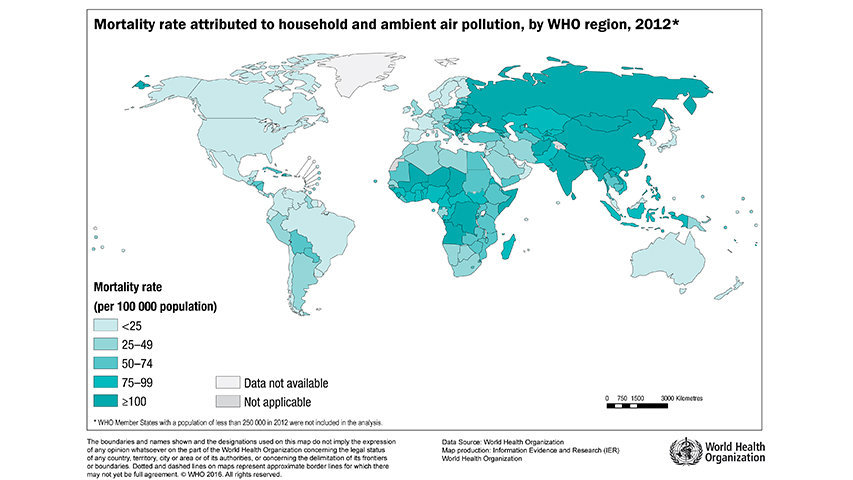
A Simple Act of Breathing might be Killing You
by Shruthi Venkatesh October 29 2018, 3:09 pm Estimated Reading Time: 3 mins, 35 secsAccording to a recent survey by the World Health Organisation, a simple act of breathing is killing 7 million people a year and harming billions more. The research reveals profound impacts on the health of people, especially children.
Air pollution is termed as the “new tobacco” by Dr Tedros Adhanom Ghebreyesus, the director general of the World Health Organisation (WHO). Calling air pollution “a silent public health emergency”, Dr Tedros, in an article in The Guardian, says, “The world has turned the corner on tobacco. Now it must do the same for the ‘new tobacco’ - the toxic air that billions breathe every day. No one, rich or poor, can escape air pollution”, he says. “This is a defining moment and we must scale up action to urgently respond to this challenge.”
_thedailyeye.jpg)
Air pollution is the 'new tobacco', warns WHO head (Flipboard) thedailyeye
In order to implement strategies which will help hasten the efforts to reduce air pollution significantly, the WHO is organising the first ‘Global Conference on Air Pollution and Health’ at its headquarters in Geneva on 30 October and 1 November 2018. This conference is said to be attended by Ministers of Health and Environment of various countries and other representatives. The goal is to take high-level action at which nations and cities are expected to make new commitments to cut air pollution.
4.2 million deaths occur every year as a result of exposure to ambient (outdoor) air pollution. Whereas 3.8 million deaths occur every year as a result of household exposure to smoke from dirty cook stoves and fuels. Lima, Peru, was South America’s most polluted capital city in 2018, recording PM 2.5 at four times the WHO safe level. Nine of the world’s 10 most polluted cities in 2018 are in India, including Kanpur (173 micrograms) and Delhi (143). Baoding, China, recorded 93 micrograms this year. On the whole, statistics shows that 91% of the world’s population lives in places where air quality exceeds WHO guideline limits.
“Children and babies developing bodies are most at risk from toxic air,” said Dr Maria Neira, WHO director for public health and the environment. She further states to The Guardian, “we have to ask what are we doing to our children, and the answer I am afraid is shockingly clear: we are polluting their future, and this is very worrying for all us.” 300 million live in places where toxic fumes are six times above international guidelines. The latest government action plan, called “pitiful” by environmental lawyers, revealed air pollution was actually much worse than previously feared.

Map of mortality attributed to househol ... region (World Health Organization)
The WHO is working with health professionals not only to help their patients, but also to give them the skills and evidence to advocate for health in policy decisions such as moving away from fossil-fuel-powered energy and transport. “No person, group, city, country or region can solve the problem alone,” Tedros said. “We need strong commitments and actions from everyone.”
Daniel Krewski at the University of Ottawa, one of the team behind the newer estimate, said: “This suggests that outdoor air pollution is an even more important risk factor for health than previously thought.” As each month passes, studies shows the further harms of toxic air including a huge reduction in intelligence, millions of diabetes cases and the first direct evidence of pollution particles in mothers’ placentas. This also results in a colossal economic burden- costing the lives $5 trillion a year, according to a World Bank report.
The only way now is to tackle air pollution by closing polluting power plants and shifting to cleaner transport, such as cycling or electric cars, which has a double benefit as it also tackles climate change. That’s funny when politicians come up to reveal the precautions now and then, but citizens will start to take them to court for the harm they have suffered, that they didn’t know. All they got to do is to sit and watch the process while we as citizens need to react collectively and in a very dramatic and urgent way.




-173X130.jpg)
-173X130.jpg)
-173X130.jpg)
-173X130.jpg)
-173X130.jpg)
_(1)-173X130.jpg)

-173X130.jpg)